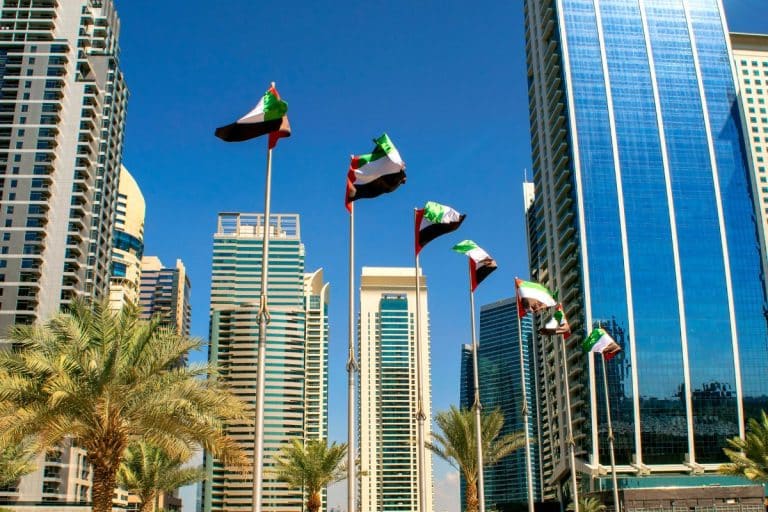New rules were announced across the country that have come into effect since the start of the 2023.
Here are the new rules and what they mean:
Unemployment insurance
The mandatory unemployment insurance came into effect in the UAE on January 1, 2023.
The UAE’s Ministry of Human Resources and Emiratisation (MoHRE) first announced the Unemployment Insurance Scheme for all government and private sector employees back in May 2022.
The MOHRE has now issued a video guide on social media to explain the benefits and costs of the UAE unemployment insurance.
In the video the MOHRE explains the two categories of insurance available to UAE workers.
Two categories of unemployment insurance are available, depending on the worker’s salary.
UAE unemployment insurance Category A
Category A costs AED5 per month. It can be paid monthly, quarterly or annually.
This category of insurance is open to any employee who has a monthly salary of AED16,000 a month or below.
In the event of losing their job UAE workers would be entitled to 60 per cent of their average basic salary, calculated on an average of the six months leading up to unemployment.
The sum is capped at AED10,000 per month and is payable for three consecutive months.
The limit on unemployment insurance on this category, then, would be AED30,000 ($8,169) to be paid out on the annual fee of AED60.
UAE unemployment insurance Category B
Category B costs AED10 per month. It can be paid monthly, quarterly or annually.
This category of insurance is open to any employee who has a monthly salary above AED16,000 a month.
In the event of losing their job UAE workers would be entitled to 60 per cent of their average basic salary, calculated on an average of the six months leading up to unemployment.
The sum is capped at AED20,000 per month and is payable for three consecutive months.
The limit on unemployment insurance on this category, then, would be AED60,000 ($16,338) to be paid out on the annual fee of AED120.
Insured amounts will not be applicable if the employee was dismissed for disciplinary reasons under the Labour Relations Law and Human Resources Law, in addition to any applicable legislation.
As has been previously reported on Arabian Business, the insured compensation will not be given if there has been fraud or deceit involved in the claim or if the listed place of employment is fictitious.
Fines and penalties will be issued in this case.
If the individual finds a job during the period of compensation entitlement, the payment will cease.

UAE employees can use the following subscription channels for the insurance scheme:
- Insurance Pool’s website and its smart application
- Bank ATMs and kiosk machines
- Business service centres
- Money exchange companies
- du and Etisalat
- SMS
According to the Insurance Pool website, in order to be eligible for compensation, the insured must meet the following criteria:
- There must be a minimum subscription period of 12 consecutive months for the insured in the scheme. Provided that there is no interruption in the subscription for three consecutive months
- The Insured was committed to pay all the insurance premiums due on time
- The Insured proves that the reason of unemployment is not due to resignation
- The Insured may not be dismissed for disciplinary reasons under the Labour Relations Law and the Human Resources Law of the federal government in addition to any applicable legislation
- Submit the claim within 30 days from the date of loss of the work relationship or the settlement of the labour complaint referred to the judiciary
- The Insured worker should not have an existing complaint related to the absence from work
- The Insured shall not be entitled for compensation if there has been fraud or deceit involved in his claim or if the establishment where they work for is fictitious
- The Loss of Employment should not be the result of non-peaceful labour strikes or stoppages, whether they result in harm or not
- The Insured must be legally present in the United Arab of Emirates
Emiratisation
UAE firms will now face fines of AED72,000 for every Emirati not hired as per Emiratisation targets.
Companies with more than 50 employees must ensure that 2 percent of employees are Emirati, the deadline to implement this was January 1. The move is in line with the government’s Nafis initiative.
Firms that fail to meet the targets will be fined at a rate of AED6,000 a month or AED72,000 a year.
Three points for employers:
- Companies are prohibited from referring to government policies or their benefits in Emiratisation job advertisements without obtaining a permission from MoHRE
- Misleading advertisements and unskilled job vacancies are banned
- Employers’ obligations are specified when recruiting UAE nationals, appropriate workplace and tools to Emirati employees are required
As per the Nafis initiative, the UAE aims to ensure that 10 percent of the private sector firms are made up of Emiratis by 2026.

Ministry of Human Resources and Emiratisation (MoHRE) said, “The Ministry of Human Resources and Emiratisation (MoHRE) issued Ministerial Resolution No. 663 of 2022 regarding compliance with Emiratisation regulations in the private sector.
“It specifies compliance with Emiratisation systems, job advertisements, employer obligations when recruiting UAE nationals, provision of appropriate workplace and tools to Emirati employees, and related fines and penalties.
“Expanding Emiratisation in the country requires regulating all aspects and components. We are keen to specify the duties and obligations of all parties, set laws to regulate recently observed violations through intensifying inspection visits, define necessary measures and ensure that all parties follow them.”
The UAE thanked private sector companies on Sunday that achieved Emiratisation targets last year.
“The Ministry (MoHRE) thanks private sector companies that achieved the required Emiratisation targets of 2022. We look forward to strengthening our cooperation to achieve the 2023 targets, up to a 10 percent growth of Emiratisation in skilled jobs in 2026,” the UAE’s Ministry of Human Resources and Emiratisation (MoHRE) said in a statement.
Emiratisation, under the government’s Nafis initiative, also required companies to follow certain rules set by the Ministry of Human Resources and Emiratisation (MoHRE). This include a ban on misleading advertisements, and hiring Emiratis only for skilled jobs.
UAE plastic ban
Two emirates in the UAE have issued a ban on plastic bags that has come into effect from January 1, 2023.
Ajman and Umm Al Quwain has banned the use of plastic bags, announced last year, comes into effect in 2023.
The Ajman Municipality and Planning Department has announced the ban on use of plastic bags, the Emirate has a ‘Plastic Bag Free Day’ on May 16 every year where the use of plastic bags is banned for commercial establishments. Last year, the number of plastic bags reduced by 219,000 on the day of the campaign said Khalid-Al Hosani, executive director of the public health and environment sector.
Umm Al Quwain has also banned the use of single-use plastics, the rule came into force on January 1, 2023. All bags used must be biodegradable, multi-use or made of paper or woven cloth. Similar plastic bans were also implemented in 2022 across other emirates including Dubai, Sharjah and Abu Dhabi.





